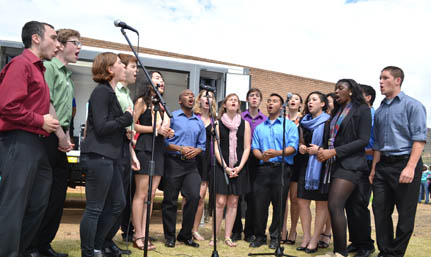Latest News Archive
Please select Category, Year, and then Month to display items
27 October 2025
|
Story Sefako Mokhosoa
|
Photo Supplied
 Ten Grade 12 learners from Mampoi Secondary School in Phuthaditjhaba.
Ten Grade 12 learners from Mampoi Secondary School in Phuthaditjhaba.
On 1 October 2025, the Projects and Innovation Directorate in the Faculty of Education at the University of the Free State (UFS) proudly hosted a certificate ceremony to honour ten Grade 12 learners from Mampoi Secondary School in Phuthaditjhaba on the Qwaqwa Campus. These learners completed a Skills Development Initiative and Workshop Series focused on digital literacy and ICT skills – a programme designed to equip rural youth with the tools they need to thrive in a digital world.
The initiative, which ran from May to August 2025, was made possible through a strategic partnership with BANKSETA to bridge the digital divide in rural communities. The learners received hands-on training in essential digital tools. Each learner also received a tablet to support continued learning and personal growth beyond the classroom.
The Director of the office in the Faculty of Education, Dr Kwazi Magwenzi, stressed that digital skills promote independence and self-directed learning. “Grade 12 is a time when learners should manage their studies, meet deadlines, and explore their options,” she said. “Digital fluency supports that autonomy. It enables learners to use online research, interactive tools, e-learning, and collaboration platforms to make learning more effective, flexible, and aligned with their pace and style. In Grade 12, where the stakes are high – with exams, tertiary entrance, and career choices – this ability helps learners become more self-directed, confident, and equipped.”
The programme not only built learners’ confidence in using ICT tools for learning and communication but also prepared them for the technologically driven environments they will encounter in institutions of higher learning.
Beyond developing digital skills, the project offered learners valuable exposure to the university environment, as their training took place on campus. Inspired by the success of this pilot, the Faculty of Education now aims to expand the initiative to reach more schools and learners across the region. The vision is to scale up access to digital education and empower more young people in rural areas with the skills necessary for academic and professional success.
This ceremony marked the conclusion of a successful training programme and the beginning of a long-term commitment to digital empowerment and lifelong learning in rural communities.
Stanford University Talisman group blows Qwaqwa Campus away
2013-03-28
|
 |
|
'Angelic'. That is how some students described Talisman's rendition of well-known South African hymns and classics.
Photo: Thabo Kessah
28 March 2013 |
The UFS Qwaqwa Gospel Choir hosted a concert and shared the stage with the Stanford Talisman, a unique group of students from Stanford University in the USA, who sing a wide repertoire of genres, which include indigenous South African songs. According to their website, ‘Talisman was created to explore and perform substantive, cultural music’ and this is some of the music they brought to the Qwaqwa Campus.
“This unique pre-Easter concert brought all of us together through music which knows no boundaries,” said Sipho Mnyakeni, who heads Residence Life on the Qwaqwa Campus.
The Stanford Talisman choir left crowds in awe and disbelief with their rendition of indigenous Sesotho, IsiZulu and IsiXhosa hymns. Some of the songs were well-known classics composed and previously performed by the likes of Hugh Masekela and the late Miriam Makeba. One song that blew the audience away, was the well-known South African struggle song 'Asimbonanga' by Johnny Glegg, which was a tribute to the then incarcerated Nelson Mandela.
The groups were supported by Hlanganani, an IsiZulu traditional music student ensemble, and the poet, Black Butterfly.